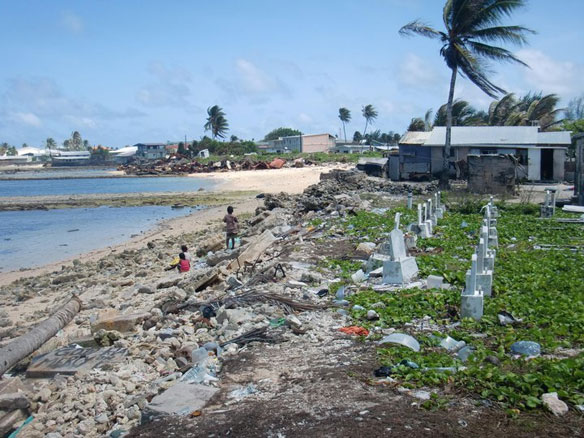Over two dozen deceased Japanese soldiers have been unearthed from their graves. The culprit is not some run-of-the-mill grave robber, but the ocean itself. The remains were buried near the coast of the Marshall Islands, and high tides washed over them revealing their skeletons. All of the graves were from the Second World War, and this is the first major disturbance since the Japanese soldiers were first buried there decades ago.
Some have worried that this event foretells flooding in the near future, as it would appear that water levels are much higher than they once were. Residents are tying this into threats of global warming and have addressed the United Nations regarding the problem. The unearthing of the Japanese soldiers appeared to them as a warning sign that the tens of thousands of residents may be in danger if the height of the water levels continues to increase. In fact, there is increasing concern that most of the islands may be almost completely submerged by the end of a few decades.
The crux of the problem is that the grand majority of the Marshall Islands are only a few feet over sea level, meaning that any significant rise of the ocean’s surface could more or less eliminate the islands’ existence. The Japanese soldiers were close enough to the coast that they only signal the beginning of a major rise, but the nation has concerns that climate change may be the end of their home country, The Telegraph reports.
Some landmarks have already disappeared. The president of their nation has noticed the beaches declining as a need for reworking of major roadways has increased. The disappearance of major portions of land have also largely affected the islands’ agriculture. The Japanese soldiers who washed away were a sign of what is to come if this problem does not cease in the near future. Those who are still alive have to deal with the possibility that they may lose property due to rising tides, thus forcing them to move as many have already had to do.
Even before the Japanese soldiers washed away, it was becoming increasingly clear to the locals that the rising sea levels were a major problem. The fact that it has impacted the burial of over two dozen men who gave their lives in WWII simply puts a profound emphasis on the solemnity of the issue. If a solution is not found quickly, the islands may meet a similar fate as that of the Japanese soldiers, washed away and buried at sea.
